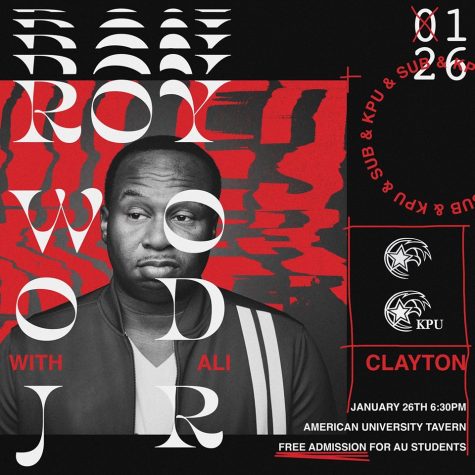Investigating AU's Alcohol Climate: Transport Trauma
It was late on a Thursday night when Alice, who wished to remain anonymous, went to one of the first fraternity parties of her college career. A freshman at American University, Alice hadn’t ever had much alcohol before, and she had never smoked weed. It was a night of firsts for her.
“I drank a lot,” she said. “I had like eight shots of vodka in a span of 45 minutes. I’d never gotten high before, so my roommate was like ‘Why don’t you try it?’”
After Alice left the party with several friends, she started to feel panicked and out of control. When she got back to her room, she started having flashbacks and her anxiety quickly escalated.
“I was assaulted my junior year of high school,” she said. “When I get stressed out, that comes out. Not having experienced being high before kind of triggered it. I started having a panic attack and there were like five people in the room, they all had the best intentions, but they didn’t really know what to do with a panic attack.”
Eventually, her roommates called a transport.
When it arrived, Alice cried and pleaded with the Emergency Medical Service (EMS) team to let her stay. She insisted she was okay; she was just feeling anxious. She said she didn’t need to go to the hospital. She clung to the bed and physically resisted leaving.
“I repeatedly told them I was fine and I didn’t need it, but they just took that as a drunk girl saying she wasn’t drunk,” Alice said. “They didn’t listen. They had told them how much I’d had to drink, so they thought I was just too [intoxicated] to make a decision for myself.”
According to a representative of the Office of Campus Life, the EMS team was just following policy.
“Students are transported when their apparent use of alcohol or other drugs has resulted in their inability to take care of themselves,” the representative said in an email. “[The other necessary factor is] when their level of intoxication appears to place them at risk of injury or illness, if a medical evaluation is not conducted.”
But once she arrived at the hospital, Alice said she received no medical treatment. They didn’t pump her stomach or give her any medication for her anxiety.
“The doctors didn’t give me any help or try to calm me down, they just let me ride it out by myself in a hospital room,” she said.
Starting in the fall of 2016, nights like these may be avoidable for some students. Last year, AU announced that it will be changing its alcohol policy. According to the Campus Life representative, the university will pilot a policy where students over the age of 21 who don’t have roommates under the age of 21 will be able to drink and possess alcohol in residence halls.
According to an article published in The Eagle, AU is one of the only area universities that abided by such strict alcohol policies.
“We learned that of all the schools, only two schools did not allow alcohol, American and Howard University, in resident halls,” Chris Moody, assistant vice president for housing and dining programs, told The Eagle. “It shows that other campuses have an open mind to a policy that becoming 21 and the ability to drink alcohol as a legal adult is part of that normalized process.”
For Tim Titus, an adjunct professor, AU alumnus and former Resident Assistant (RA), this policy is more in line with those he remembers from his time at the university.
“In the mid-80s, AU was a pretty hard-drinking establishment,” Titus said. “At night they used to roll out kegs on the Quad. Everybody could have some. It was all very open.”
When Titus was an RA, students were usually only transported “if they were semi-conscious or unable to engage in a discussion.”
Now, however, Public Safety has developed different standards. According to a statement on the AU website, when called to a potential emergency situation, Public Safety officers evaluate the condition and decide whether to call the transport.
“If they determine your condition is a medical emergency, [DC Fire and EMS] will be contacted to assess you and determine whether a hospital transport is necessary,” the statement reads. “If this is this case, you will be transported by ambulance to the hospital.”
Alice believes in her case, the officers were wrong. But, despite her insistence and physical resistance, she was taken.
“[Taking somebody involuntarily] is a very grey area,” said Tim Wilson, director of communications at DC Fire and EMS. “It’s on a case-by-case basis.”
Wilson said that there was no universal rule for when to take somebody who is resisting a transport. He said that EMTs use reason and compassion before force.
“Usually [they] try and convince the patient to come,” he said. “[They] say ‘Hey, you’re not okay, you need to come with us.’”
Wilson added that EMTs do not generally perform any specific tests to determine somebody’s risk of lethal intoxication, but does make basic assessments of the patient’s health.
“We of course take their vitals, make sure they’re stable and if we think there is a threat to the patient’s life, we transport them immediately.”
Sometimes, EMS will take the advice of others on scene, Public Safety included. But the final call, according to Wilson, is that of the EMT or paramedic.
“Ultimately, what we look at is what is the best way to care for a patient,” he said.
If a patient is having an panic attack, it’s no different, but in this the attack cost Alice $600 for her ambulance ride and hospital stay, which she has yet to pay off.
Still, it’s true that drinking alcohol can have fatal consequences. According to a report from the National Institute on Alcohol Abuse and Alcoholism, roughly 1,825 college students between the ages of 18 and 24 die as a result of drinking each year. Over 90,000 are sexually assaulted and nearly 600,000 are injured in relation to alcohol. So far in the current academic year, 44 AU students have been transported for reasons related to alcohol; in the previous year, that number was 52, according to the representative of Campus Life.
It may be too late to change Alice’s situation. At the end of the day, she was underage and she was drinking. AU’s policy toward drinking under 21 will not change. However, the new policy may encourage a drinking culture where students better at assess risk and making good decisions without fear of consequences.
“Changes [in campus age demographics] prompted the pilot policy,” the Campus Life representative said. “We are committed to encouraging the responsible consumption of alcohol for those who choose to drink and are of legal drinking age. Our aim is always to influence students toward responsible conduct.”
University Communications and Public Safety did not respond to ongoing requests for comment in time for print.

I'm a Senior majoring in Journalism, interested in science, drug policy, homelessness, crime and punishment, and philosophy.
I emerged from the woods...






